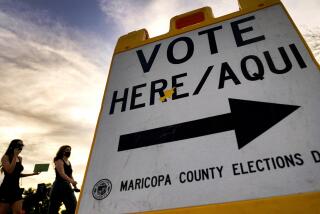Supreme Court ruling could affect congressional districts in California

An old statehouse joke has it that the once-a-decade process of redrawing election districts gives politicians a right to pick their voters, rather than the other way around.
Now, the Supreme Court is being asked to turn that wry comment into a constitutional rule.
The justices will hear an appeal Monday that Arizona’s Republican-controlled Legislature has brought. The legislators want the justices to rule that only elected state lawmakers, not voters or an independent citizens commission, may draw the boundaries of districts for members of the U.S. House of Representatives.
The case turns on the interpretation of a single word in the Constitution, but its effect could be widespread. If the challengers win, the ruling could eliminate the role of California’s voter-approved redistricting commission in drawing congressional districts and similar bodies in several other states and halt what many reformers have seen as the best check on partisan gerrymandering.
While gerrymandering is hardly new — having been named for a salamander-shaped district created in 1812 to favor Massachusetts Gov. Eldridge Gerry — computer software has given political operatives ever-better tools to draw lines that create safe seats for their party’s candidates.
Shrewd line-drawing also permits the party in power to translate a thin majority of votes into solid control of a congressional delegation, often for a decade until the next census. In Pennsylvania, for example, a Democrat has regularly won the vote for president in recent decades, yet Republicans in Harrisburg used their legislative majority to draw districts that gave the GOP control of 13 of the 18 seats in the House of Representatives.
Political scientists argued in briefs to the court that partisan gerrymandering not only deprives voters of a real choice on election day, but also contributes to partisan gridlock in Washington. Elected from safe seats, members of the House — whether liberal Democrats or conservative Republicans — have “little incentive to seek compromise or to challenge the party line,” they said.
In 2000, Arizona’s voters decided to take the line-drawing power away from elected legislators in Phoenix and hand it to a five-member independent commission. California’s voters did the same by approving ballot measures in 2008 to create an independent commission for the state legislative districts and in 2010 to extend the commission’s authority to congressional districts.
Four other states — Washington, Idaho, Hawaii and New Jersey — have largely independent redistricting bodies, which could be affected by the court’s ruling. Several others have advisory commissions that are not likely to be affected.
“A lot is riding on this case,” said Bruce Cain, a Stanford political scientist. The independent commissions, though still new, have given voters some confidence that lines are not being manipulated to favor a candidate or party, he said.
In California, the state commission’s first effort at redistricting “resulted in the fairest and most competitive elections in California history,” Allan Zaremberg, president of the California Chamber of Commerce, said in January. He joined former Govs. George Deukmejian, Pete Wilson and Arnold Schwarzenegger, all Republicans, in a brief that urges the court to uphold the independent commissions. All three governors dealt with Democratic gerrymanders during their time in Sacramento and became strong advocates for taking redistricting power away from elected officials.
In Arizona and some other states, however, Republicans see independent commissions as serious threats to their control over the process. Republicans fully control the Legislature and hold the governorships in 23 states. Democrats have full control in only seven.
And the independent commissions face a serious challenge. Paul Clement, the former solicitor general under President George W. Bush, who represents the Arizona Republicans, points to the words of the Constitution. It says, “the Times, Places and Manner of holding Elections for Senators and Representatives shall be prescribed in each State by the Legislature thereof,” although Congress may “alter” the rules if it decides to do so.
“The term ‘Legislature’ is clear and explicit and has an unambiguous meaning,” Clement said. It refers to “the representative lawmaking body of the state,” not the voters as a whole or a separate panel.
As if to highlight the political stakes, former Clinton-era Solicitor Gen. Seth Waxman will defend Arizona’s independent commission.
He will argue that the word “legislature” in the Constitution refers broadly to the lawmaking process in the state. And in Arizona and California, that includes initiatives adopted by the voters. Defenders of the commissions also say Clement’s argument proves too much. If all power indeed resided with the legislature, it would suggest the governor would have no authority to veto a redistricting bill, they say.
The court is expected to rule on the case sometime this spring.
More to Read
Sign up for Essential California
The most important California stories and recommendations in your inbox every morning.
You may occasionally receive promotional content from the Los Angeles Times.











